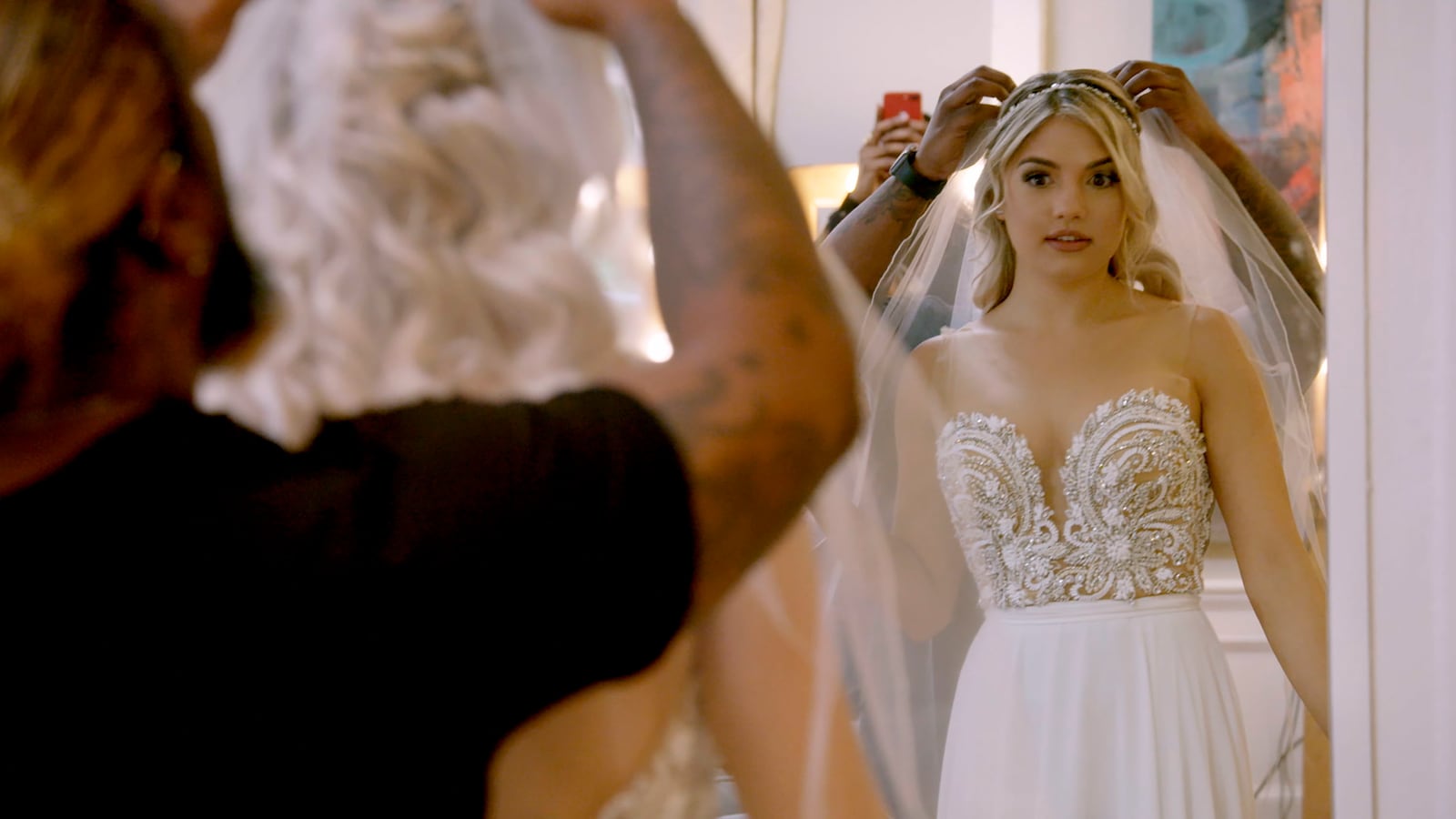There’s been a question to grapple with in recent years, as certain TV shows spike a rare, rabid mass popularity: Is the series that everyone is obsessed with actually good, or is it just on Netflix?
Love Is Blind, the deranged reality TV dating series that launched at the end of February and has since inspired a flurry of binges, memes, group texts, and social media fascinations, is the latest test case.
Couch Culture’s slavish devotion to Netflix has allowed the streaming service to maintain constant domination of the water-cooler discourse, with one series watched out of reflexive duty to whatever is new on the platform replacing another in perpetuity—regardless of whether the show is worth umpteen hours of your time.
Pavlovian sampling leads to binge investment which leads to word of mouth and then palpable popularity: Cheer, Don’t F**k With Cats, Sex Education, The Goop Lab, The Witcher, and more. Some are great, some are disastrous.
But Love Is Blind, taken alongside Netflix’s other recent reality TV phenomenon, the bizarre social-media competition series The Circle, raises the profile of a different, larger question—particularly as the potential success and reach of a show that takes off on Netflix explodes. Basically: When is garbage TV good, harmless fun, and when is it just plain garbage?
It’s a question that’s circled reality TV for decades now, as we’ve stopped being polite and started getting real, kept up with the Kardashians, accepted roses, and city-hopped with housewives.
There have been merits to both sides of the debate. On the one hand, these are shows that can offer funhouse-mirror reflections of real cultural debates and insight into how society views and polices race, gender, addiction, sexuality, and privilege. At their best, they can—and should!—be viewed as comedies of manners, or windows of empathy into unfamiliar life experiences.
On the other hand, they are baseless trash slowly rotting away our brain cells. Both arguments are accurate.
There are installments of Bravo’s Real Housewives franchises that rival the best-edited comedies on television, while painting colorful strokes of Shakespearean drama with a palette of the casts’ harsh realities. The Real Housewives of New York City, returning in a month, is the best of the bunch.
Shows like Queer Eye, Cheer, Are You the One?, Born This Way, and RuPaul’s Drag Race find ways to spotlight and celebrate marginalized experiences, on a spectrum of tenderness and debauchery.
Top Chef, Project Runway, Next in Fashion, Nailed It!, Survivor, The Amazing Race—the best competition series reveal certain truths about human behavior when intoxicated by ambition and prize money, allowing audiences to revel in the heightened emotions of these pressure-cooker situations.
And there is no use in denying the symbiotic circle of influence between our culture and the Kardashians, lest you want to appear like the most tired and obtuse cultural critic.
But there is also the indisputable truth that a solid 70 percent of reality TV offerings are exploitative distractions, mindless slogs of inanity with no inherent value or justification for your time. There is no judgment, really, to anyone who enjoys these shows anyway. If sports, cable news, and The Big Bang Theory reruns are defensible ways of passing one’s evenings, then so, too, is bad reality TV.
To that end, I couldn’t make it through three episodes of The Circle without having to turn it off. I understood that its premise is intriguing, topical, and fresh, even if a bit apocalyptic when it comes to what it says about society. What if people in isolation could only communicate through social media, and, if they could manipulate their own social media presence to perfect likability, win the only thing greater than influencer status: money? Outside of Michelle Buteau’s brilliant, hilarious hosting, it was an irritating bore.
But not everyone shared my distaste for it. Enamored by its unique blend of lunacy and mundanity—hours spent watching moderately interesting people choose profile photos and slide into DMs—those who watched the show turned to fellow fans and friends on social media to dissect its silliness.
Shows like Big Brother and, now, The Circle foster a sense of community among those who watch, alternating between ridiculing the goings-on and seriously discussing strategy and gameplay. It’s why Netflix, with its instantaneous reach, is perfect for a show like this. Even if it is objectively bad, at least that, one can suppose, is an inherent value.
And then there is Love Is Blind.
Everyone is talking about Love Is Blind. Its reign of terror is such that people I would never have imagined tuning in are intrigued and, in turn, addicted. The Daily Beast’s editor-in-chief made a perfect reference to it in our Slack, where there is an entire chat room devoted to discussing it. Even SNL has taken notice.
What’s remarkable about Love Is Blind may not actually, in the grand landscape of reality TV, be remarkable at all. It is a show that, the more of it you watch, the more fascinating it becomes, despite the fact that it is terrible in every way.
The idea of the show is that participants searching for love speed-date over the course of several days in pods that allow them to speak without ever seeing each other. As various romantics disclose their deepest truths to walls in these isolation chambers, they forge connections without ever knowing what the other person looks like. They can only meet if they get engaged, a demented and unnecessary escalation in stakes, but, hey, it’s TV.
They then go on a Mexican vacation together, move in together, meet each other’s families, pick out wedding dresses and tuxes, and stand at an altar where they decide whether the experiment worked—whether love truly is blind—and they either say I do, or walk away forever.
It’s captivating because it’s so dumb, which should hardly be an endorsement.
None of it makes sense.
That any of these people would actually want to get married and aren’t just manufacturing feelings because they’re on television requires a wilder suspension of disbelief than even The Bachelor.
Vanessa Lachey and husband “I’m Obviously Nick Lachey” are introduced as hosts despite only appearing in maybe four minutes total of the entire series.
People are introduced in the premiere and then never seen or heard from again as the series narrows its focus to six engaged couples. Where did they go? Are they still in the pods talking to walls?
If the idea is that love is blind, why is every person on the show so attractive? Where are the uggos?
Why is there no sunlight in their depressing condos?
And what is this phenomenon of everyone, myself included, being so attracted to someone as epically mediocre as Barnett?
Love Is Blind is both an undeniable byproduct of reality TV’s past, and a harbinger of its future. In structure, it’s a mash-up of high-concept dating shows of the past and present, echoing elements of Married at First Sight, The Bachelor, Blind Date, 90-Day Fiancé, and Love Island.
Its participants speak about love and romance as scholars of these shows, discussing connections and “truths” with the superficial, performative Hallmark vernacular of someone captioning a Facebook photo of the flower bouquet their “man” just bought them. They talk about what they’re doing—literally marrying a person they’ve known for less than a month and gotten engaged to without seeing—as an “experiment,” and we’re just meant to accept that at face value.
There were certainly personalities worth obsessing over. Jessica’s Old-Maid paranoia at just 34 years old was only rivaled by Giannina Milady Gibelli’s wild swings between ingenue-sweet and femme-fatale cutting, as if Killing Eve’s Villanelle appeared on The Bachelor. Amber’s manic ramblings were the most cringe-inducing, in that they were the most transparently those of a person acting as they assumed a reality-TV personality should. As is usually the case with these shows, summoned together, the men couldn’t produce the personality of a paper bag.
But the confusing, maybe genius thing about Love Is Blind is that, whatever you might make of individual personalities, you truly did not care if any of them found love or got married. The concept of the show is so implausible and ridiculous that, outside of the cringe-gratification of watching a person make bad decisions in real time, investment in any sort of outcome was impossible.
The entire point of the show, then, was to squirm as people performed love as they assumed Bachelor-raised audiences would want to see it, culminating in the train wreck of the wedding finales. Perfect for bingeing. Perfect for Netflix.
There’s been all kinds of defenses of shows like this. In dark times, we crave mindless television, surrendering to the fiction of “reality” just to have something innocuous to invest in—like will Jessica and Mark overcome their age gap? But when does something qualify as innocent escapism in Trumpian times, and when are we simply justifying bad taste?
Love Is Blind and its seemingly varied audience seem to suggest a more meta viewing of shows like these than people who earnestly watch The Bachelor. We’re more in on the joke here.
We recognize the individual elements of the show as patently outrageous and the idea of any real love found in it as a farce. It’s a pageantry of reality-TV tropes, in which we’re not witnessing or even rooting for romance, but scoring its entertainment value based on how well it executes the bad decisions and cringe moments we’ve come to crave from decades of dating shows on TV.
Love Is Blind, dumber than almost any dating show before it, may also be the smartest one to arrive yet. Its idiocy is purposeful, even pandering, but maybe also inspired.
Whether or not it is “good” may be entirely beside the point, as unimportant as how “real” reality TV is or whether its contestants are “there for the right reasons” became to fans years ago. Eighteen years of watching a dozen Laurens trading makeout sessions with a jawline who has a nice haircut in ruthless pursuit of a stint on Dancing With the Stars and a career as an Instagram influencer has stripped us of those delusions.
It’s reality TV in the age of meme-ing, a catastrophe orchestrated to be binged, dissected, and then just as quickly dismissed. It’s an entirely new beast. Trash TV has been redefined.








